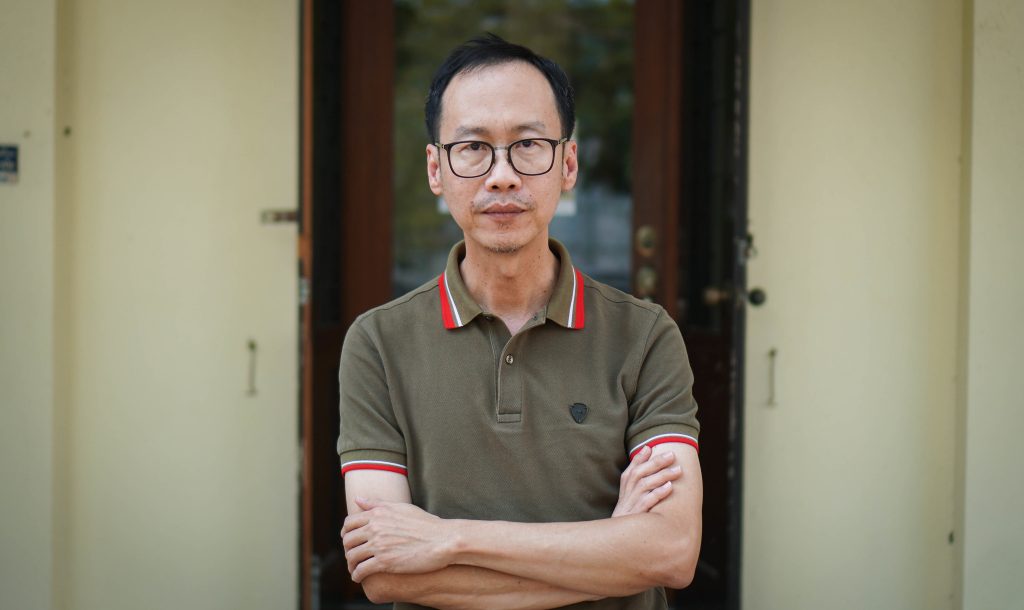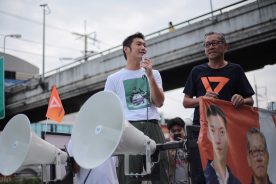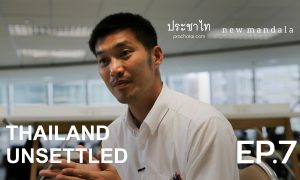As the Constitutional Court prepares to rule on the dissolution of the Future Forward Party next week, we sat down with Somchai Preechasinlapakun, head of the Legal Research and Development Centre at Chiang Mai University. This interview is an abridged and translated version of an interview filmed in partnership with the Thai news-site Prachatai as part of our Thailand Unsettled series. To watch the full interview in Thai, visit Prachatai’s page.
The Constitutional Court’s rulings are widely criticised as biased. How does it get away with such rulings when it is obliged to justify its rulings according to evidence and legal principles?
In principle, the Constitutional Court makes its rulings according to evidence and legal principles. But if we read the rulings and decisions of the Constitutional Court from 2007 to 2014, it’s evident that the Court had a tendency during that period to be combative or adversarial towards democratically elected political institutions. Rulings were never in favour of the defendant when they represented democratically elected political institutions. In contrast, several rulings concerning institutions or parties without a democratic majority invited astonishment. Take for example the Constitutional Court’s ruling not to dissolve the Democrat Party on the basis that the Election Commission had not investigated the party within the timeframe stipulated in the Constitution. The Democrat Party was the first party that the Constitutional Court declined to dissolve. Previously, it had ruled to dissolve several parties without issue, but when it came to the Democrat Party, it raised the issue of the necessary timeframe. If one reads the Constitutional Court’s rulings between 2007 and 2014, the antagonism against democratically elected bodies emerges clearly.
The makeup of the Constitutional Court also reflects the kind of expectations we should have of its rulings. The makeup of the Constitutional Court has also been changing since 2007, in the form of justices retiring. The NCPO extended the terms of some judges. In other cases, new appointments were approved by the [appointed] legislative assembly, which we all know is allied with the junta.
What ideologies or beliefs underpins the antagonism of the justices towards democratically elected constitutions?
Well, the trend I just described was not visible prior to April 2006, even though the court was established through the 1997 Constitution. What changed? I’m partial to the literature on judicial activism. Thirayuth Boonmee once proposed that the judiciary is the most appropriate body for managing Thailand’s political conflict by appealing to case studies in other countries, calling such a function “judicial activism”. Thirayuth’s proposition appeared to be well received by no small number of people, especially those who detest elected politicians. Several groups, from the middle class to elites, championed converting this ideology into political action. In other words, judicial actors took up a political role in part because an ideology prevailed in society that encouraged them to so.
Did enduring problems plague Thailand’s judiciary prior to 2006 though?
I think the most obvious problem in the Thai judiciary is the absence of checks and balances. After 2014, people began increasingly discussing the politicisation of the judiciary, including the Constitutional Court and how its rulings supported the coup. But from my perspective, from 2014 until the present, the NCPO hardly ever promulgated regulations to interfere with the courts. The junta never transferred judges away from their posts. It never appointed a president to the Supreme Court. The NCPO hardly made any changes to the judiciary.
In this respect, I would suggest that the ideology or tendencies that we’re critiquing already existed internally in the judicial system. As such, the NCPO understood there was no need to initiate transferals, removals and appointments. It already knew what kind of function the judicial institutions would fulfill in the aftermath of the coup. Accordingly, those in favour of democracy have not agreed with a large number of the court’s rulings, such as the conformation that junta orders have the force of law regardless of their content and ramifications.
I think the heart of the issues surrounding Thailand’s judicial institutions concerns their relationship with the public. Or to put it another way, the judicial system in Thailand is a closed, extremely closed, system. For example, how is the president of the Supreme Court related to the public? Besides being paid with our tax money, it’s obvious that the position is not an elected one. If we take the example of the United States as an example, the chief justices has to be approved by the senate.
How is the president of the Supreme Court appointed in Thailand? The Judicial Commission decides. And who makes up the Judicial Commission? The Judicial Commission is made up of 15 people: the president of the Supreme Court, six representatives from the Supreme Court, four representatives from the Court of Appeals, two representatives from the Court of First Instance and two expert outsiders. Only two individuals out of 15 come from outside the judicial system, which is a miniscule ratio. Once one such expert outsider in the Judicial Commission gave a media interview where he was asked about his duties in the body. He replied that he didn’t really have any, as the members of the judiciary in the Commission mostly deliberate amongst themselves.
Influential judges such as Thanin Kraivichien have said that outsiders should be barred from the Judicial Commission because they lack expertise and do not understand the customs of the court. Thanin expressed this view when the 1997 constitution drafted by the committee lead by Borwornsak Uwanno was in place. Borwornsak attempted to propose several reforms of judicial institutions, including the expansion of their connections to society at large and adjustments to the Judicial Commission. However, that constitution was overturned. At the time, Thanin wrote an open letter expressing his disagreement with such reforms and even suggested that outsiders in the Judicial Commission be removed, with membership restricted to judges.
The Thai Constitutional Court’s war on freedom of expression
While the Court has always targeted critics of the regime, it generally spared critics of its own rulings. With the rise of Future Forward Party, that's changed.
Over the past decade, the biases of Thailand’s judicial institutions have been critiqued at length, along the lines we are discussing now. Have we overlooked other problems in the judiciary?
In the past, there was little room to criticise the justice process in Thailand. I think criticisms of judicial institutions were extremely muted prior to 2006. But that has changed over the past 10 years. Don’t forget the modern judicial system was established 100 years ago if we are beginning with the era of Rama V. But this is the first time that there has been space to substantively discuss the judicial system and judicial institutions. I think the justice system must be thought of in the status of a political being, as a political institution, not a moral being. Previously, when people discussed the justice system or the individuals who occupy positions in the justice system, it was akin to discussing morally pure individuals. Some people describe even judges as half men, half phra. We have to pull these individuals into the secular world—if not our world, at least the secular world—and simply consider them as occupying a certain institutional position.
 Facebook
Facebook  Twitter
Twitter  Soundcloud
Soundcloud  Youtube
Youtube  Rss
Rss 



